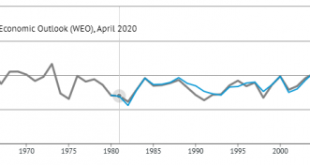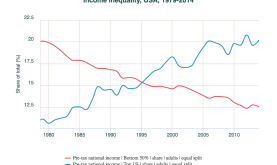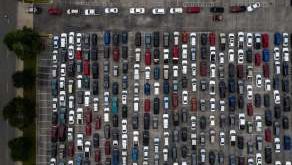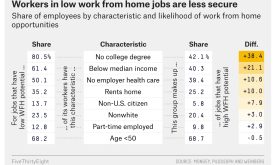from David Ruccio You know your generation’s screwed when even Monopoly is mocking you. Back in 2016, I argued that Millennials were in fact generation screwed. For example, in 2010 (when some of them were 20 to 24 years of age), their unemployment rate was 17.2 percent, much higher than the already high national average of 9.9 percent.* Partly because of the difficulty they had finding jobs, but also because they have been saddled with high student and healthcare debt, the typical...
Read More »Global economic growth in the Post World War II Era and Post COVID-19 Recovery
source: konema
Read More »Gary Becker’s big mistake
from Lars Syll The econometrician Henri Theil once said “models are to be used but not to be believed.” I use the rational actor model for thinking about marginal changes but Gary Becker really believed the model. Once, at a dinner with Becker, I remarked that extreme punishment could lead to so much poverty and hatred that it could create blowback. Becker was having none of it. For every example that I raised of blowback, he responded with a demand for yet more punishment … You can see...
Read More »Are we all in this together?
from David Ruccio It must be confessed that though the plague was chiefly among the poor, yet were the poor the most venturous and fearless of it, and went about their employment with a sort of brutal courage; I must call it so, for it was founded neither on religion nor prudence; scarce did they use any caution, but ran into any business which they could get employment in, though it was the most hazardous. Such was that of tending the sick, watching houses shut up, carrying infected...
Read More »Evolution of economic systems
from Asad Zaman Economic systems evolve, sometimes under external dynamic and sometimes under internal dynamics. As they evolve, economic theories co-evolve, however their can be (often are) lags in understanding – so theories relevant to one system are applied to another, with disastrous results. Human beings started out with tribal societies, and spent the longest period of history in this form. They societes were egalitarian and communal. They were not market oriented. Production and...
Read More »Gleaners and us—pandemic edition
from David Ruccio We already had high food insecurity in this country and now we are putting another layer of need on top of it. — Kevin M. Fitzpatrick One of the many irrational characteristics of capitalism is that billions of tons of food go to waste while hundreds of millions of people struggle with hunger on a daily basis. And like all the other senseless attributes of the way the economy is currently organized, the mismatch between the enormous quantity of food that is available for...
Read More »Fixing the bailout scammers: The Ten Percent Solution
from Dean Baker The pandemic crisis created a rare economic opportunity. In effect, the whole economy was thrown up for grabs, with the winners and losers determined by who had the political power to get a nice bailout. Needless to say, those who were already rich got the big handouts, those at the bottom got crumbs, if anything at all. Suppose we had let the market work its magic on the airlines, on the hotel chains, the restaurant chains, the aircraft industry (i.e. Boeing), and on the...
Read More »Pandemic depression antidote (IX)
from Lars Syll [embedded content]
Read More »Your job or your life
from David Ruccio source When social solidarity is essential, it’s common to hear pious sermons against class warfare. Unfortunately, there is a class war. And its victims, so many of them front-line workers, didn’t start it. — E. J. Dionne Jr. New research confirms what we’ve all been seeing for the past couple of months: the lowest paid, most precarious workers are the ones who are being forced to face the choice between their jobs and their lives. And, looking forward, as those in...
Read More »Economic theories cannot be understood outside their historical context
from Asad Zaman It is an Obvious Truth that economic theories analyze specific historical economic systems. In nomadic societies, there is no production. Economics would be about finding plants, game, and moving according to seasons. In agricultural societies, private property becomes important. Those who plant need to have rights to harvest their plantings. Feudal Societies are mostly self-sufficient in commodities and operate without money. These are barter societies. Money is not a...
Read More » Real-World Economics Review
Real-World Economics Review






